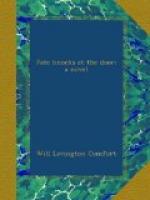Bedient had seen the hunger in the eyes of David Cairns, the empty haversack, and noted that he was neither officer nor enlisted man. Bedient had plenty of water, but with a smile he offered the other a pail and pointed to the stream. This was a pleasantry for the eyes of Boss Healy. Cairns appeared presently through the infantry, and around the end of the picket-line—a correspondent serving mule-riders with all the enthusiasm of a pitifully-tightened belt.... The packers were at their pipes and cigarettes and were spreading blanket-rolls, and groups of “chucked” infantry had warmed into singing—when the two boys sat down to supper. The cook said:
“I’m Andrew Bedient—and are you a correspondent?”
“A cub—and pretty nearly a starved cub.... There’s been nothing to buy, you know, and this outfit was hung up here grubless. The trails aren’t open enough to travel alone. Some of the officers might have taken me in——”
“We have plenty. The packers hadn’t had their coffee when I gave you the pail,” Bedient whispered. “They hate the doughboys. I wanted them to see you weren’t enlisted.... I should say the trails weren’t open for travelling alone. The niggers peppered at us all day. Healy rides through anything—says we make better time when the natives are shooting——”
“I saw how he went through the bunch that started to help you unpack,” Cairns said laughing.
... Theirs was a quick love for each other. They had not known how lonely their hearts were, until they encountered this fine mutual attraction. Together they cleaned up the supper things, and spread their blankets side by side.... Later, when only the infantry sentries were awake, and the packers’ running guard (and a little apart, the interminable glow from Healy’s cigarettes), the two were still whispering, though the day had been terrific in physical expenditure. So aroused and gladdened by each other were they, that intimate matters poured forth in the fine way youths have, before the control and concealment is put on. Grown men imprison each other.... Their low tones trembled with emotion while the night whitened with stars. Cairns wished that something of terror or intensity might happen. He hated a knife to the very pith of his life, but now he would have welcomed a passage of steel in the dark—for a chance to defend the other.
And the cook had that absolute, laughing sort of courage. Cairns divined this—a courage so sure of itself that no boastful explanations were needed. They talked about men, books, their yearnings, the recent fights. Cairns was enthralled and mystified. Bedient did not seem to hope for great things in a worldly way, while the correspondent was driven daily by ambition and its self-dreams. Life apparently had shown this cook day by day what was wisest and easiest to do—the ways of little resistance. He appeared content to go on so; and this challenged Cairns to explain what he meant to do with the next




